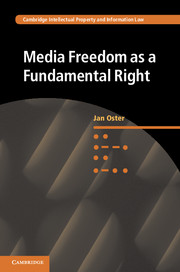Book contents
- Frontmatter
- Contents
- Preface and acknowledgements
- Table of cases
- Treaties, Conventions, Declarations and Statutes
- Reports and other documentary sources
- Introduction: aim, scope and method
- Part I The theoretical foundations of media freedom
- Part II General rules on media freedom
- 3 Beneficiaries of media freedom: who is ‘the media’?
- 4 The content of media freedom: media speech privileges and institutional protection of the media
- 5 The notion of an ‘interference’ with media freedom
- 6 Justification of an interference with media freedom
- Part III Specific limitations to media freedom
- Conclusion: tenets of a Media Freedom Principle
- Bibliography
- Index
- Cambridge Intellectual Property and Information Law
4 - The content of media freedom: media speech privileges and institutional protection of the media
from Part II - General rules on media freedom
Published online by Cambridge University Press: 05 June 2015
- Frontmatter
- Contents
- Preface and acknowledgements
- Table of cases
- Treaties, Conventions, Declarations and Statutes
- Reports and other documentary sources
- Introduction: aim, scope and method
- Part I The theoretical foundations of media freedom
- Part II General rules on media freedom
- 3 Beneficiaries of media freedom: who is ‘the media’?
- 4 The content of media freedom: media speech privileges and institutional protection of the media
- 5 The notion of an ‘interference’ with media freedom
- 6 Justification of an interference with media freedom
- Part III Specific limitations to media freedom
- Conclusion: tenets of a Media Freedom Principle
- Bibliography
- Index
- Cambridge Intellectual Property and Information Law
Summary
As examined in Chapter 2, media freedom encompasses the media speech privilege and the protection of the media as an institution. The media speech privilege includes that a person or institution, by virtue of being media and acting as media, is governed by a different set of factors concerning the intensity of protection when issuing a publication, compared to freedom of expression afforded to private individuals or non-media entities. The media speech privilege therefore both covers and extends beyond the rights provided under freedom of expression in general (see Section 4.1). The institutional protection of the media encompasses certain rights that are not available under freedom of expression at all and are related to the media in its newsgathering, editorial and distribution process and to the existence of an independent media (see Section 4.2).
The protection of ‘media speech’
Freedom of expression generally, and thus also media freedom, includes the freedom to receive and impart information and ideas without interference by public authorities and regardless of frontiers, as Articles 19(2) ICCPR, Article 13(1)2 ACHR and Article 10(1)2 ECHR almost identically stipulate. Furthermore, Article 19(1) ICCPR and Article 10(1)2 ECHR protect the freedom to hold opinions and Article 13(1)1 ACHR protects the freedom of thought. Article 9 AfCHPR protects the right to receive information and to express and disseminate one's opinions.
Therefore, freedom of expression can be sub-categorised into freedom to hold opinions and impart and receive ideas on the one hand, and to receive and impart information on the other hand. The clause ‘regardless of frontiers’ within the meaning of Article 19(2) ICCPR, Article 13(1)2 ACHR and Article 10(1)2 ECHR guarantees that cross- border speech, such as publications transmitted via broadcasting or the internet, enjoys the same freedom of expression protection as domestic speech. Furthermore, freedom of expression prohibits any distinction between the protected freedom of expression of nationals and that of foreigners, and thus the preclusion of a foreigner from re-entering on grounds of his past opinions.
- Type
- Chapter
- Information
- Media Freedom as a Fundamental Right , pp. 69 - 101Publisher: Cambridge University PressPrint publication year: 2015



